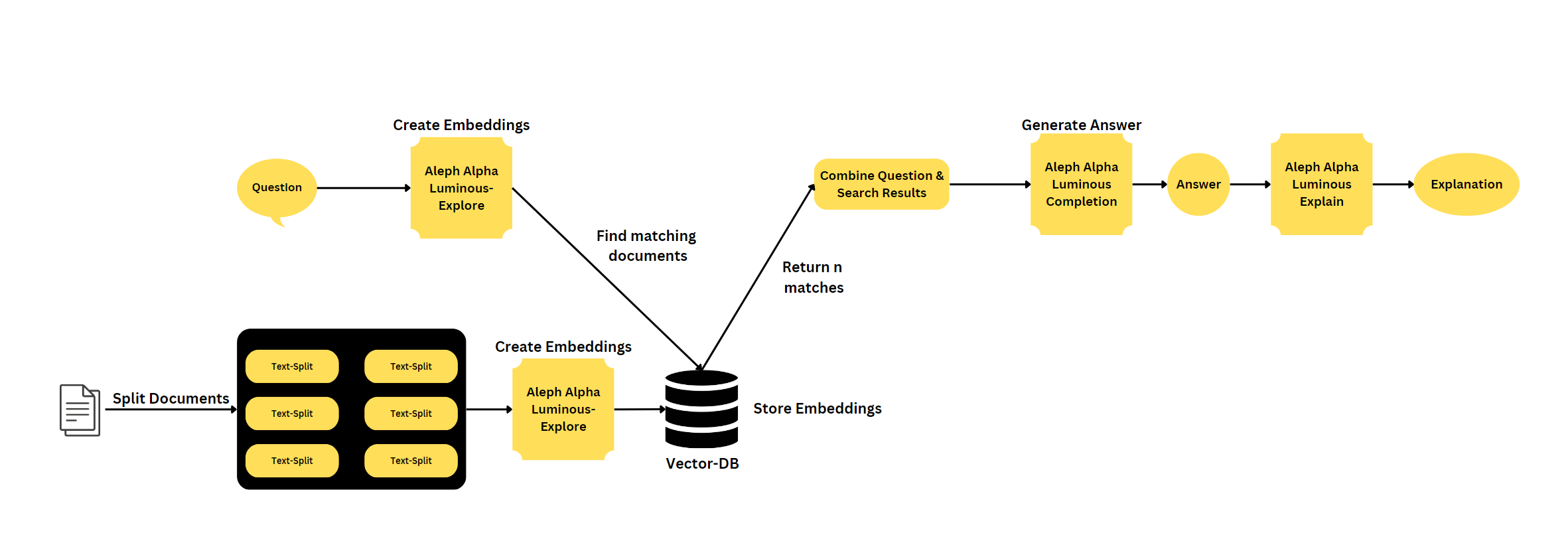This is a Rest-Backend for a Conversational Agent, that allows to embedd Documentes, search for them using Semantic Search, to QA based on Documents and do document processing with Large Language Models.
- Added Qdrant as a vector database.
- Added GPT4All as a LLM Backend. It does not work if you build a docker image on a mac device.
To run the complete system with docker use this command:
git clone https://github.com/mfmezger/conversational-agent-langchain.git
cd conversational-agent-langchainCreate a .env file from the .env-template and set the qdrant api key. For tests just set it to test. QDRANT_API_KEY="test"
Then start the system with
docker compose up -dThen go to http://localhost:8001/docs or http://localhost:8001/redoc to see the API documentation.
This project is a conversational agent that uses Aleph Alpha and OpenAI Large Language Models to generate responses to user queries. The agent also includes a vector database and a REST API built with FastAPI.
Features
- Uses Aleph Alpha and OpenAI Large Language Models to generate responses to user queries.
- Includes a vector database to store and retrieve information.
- Provides a REST API built with FastAPI for easy integration with other applications.
- Has a basic gui.
Semantic search is an advanced search technique that aims to understand the meaning and context of a user's query, rather than matching keywords. It involves natural language processing (NLP) and machine learning algorithms to analyze and interpret user intent, synonyms, relationships between words, and the structure of content. By considering these factors, semantic search improves the accuracy and relevance of search results, providing a more intuitive and personalized user experience.
Langchain is a library for natural language processing and machine learning. FastAPI is a modern, fast (high-performance) web framework for building APIs with Python 3.7+ based on standard Python type hints. A Vectordatabase is a database that stores vectors, which can be used for similarity searches and other machine learning tasks.
- Aleph Alpha Luminous
- GPT4All
- (Azure) OpenAI
If you want to use a default token for the LLM Provider you need to create a .env file. Do this by copying the .env-template file and add the necessary api keys.
If you are working in an envoironment with internet connection the easiest way is to use this command:
docker compose -f docker-compose-hub.yml upThis will pull the image from docker hub and run it. Instead of building it on your local machine.
If you want to build the image on your local machine you can use this command:
docker compose upTwo ways to manage your api keys are available, the easiest approach is to sent the api token in the request as the token. Another possiblity is to create a .env file and add the api token there. If you use OpenAI from Azure or OpenAI directly you need to set the correct parameters in the .env file.
First install Python Dependencies:
pip install poetry
poetry installStart the complete system with:
docker compose up -dTo run the Qdrant Database local just run:
docker compose up qdrantTo run the Backend use this command in the root directory:
poetry run uvicorn agent.api:app --reloadTo run the tests you can use this command:
poetry run coverage run -m pytest -o log_cli=true -vvv testsTo run the Frontend use this command in the root directory:
poetry run streamlit run gui.pyQdrant Dashboard is available at http://localhost:6333/dashboard. There you need to enter the api key.
To use the Qdrant API you need to set the correct parameters in the .env file. QDRANT_API_KEY is the API key for the Qdrant API. And you need to change it in the qdrant.yaml file in the config folder.



